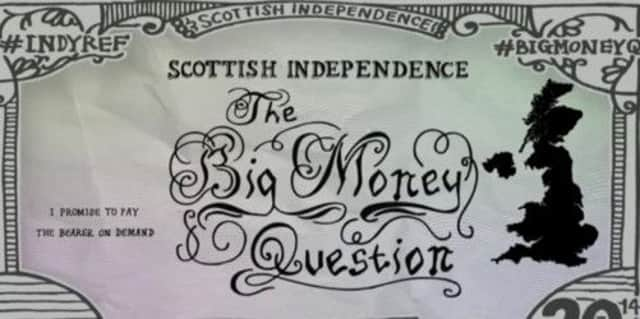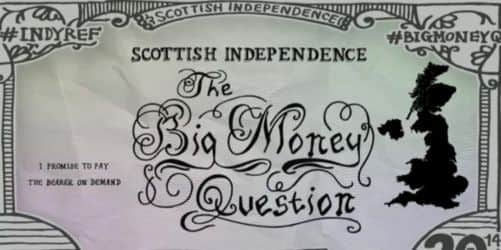Scottish independence: Oil for debt swap proposed


The possibility of Scotland passing its oil revenues to the UK in return for debt reduction was put forward in a report by the National Institute of Economic and Social Research (NIESR), which concluded Scotland would have to pay a higher interest rate than the rest of the UK in order to service its debts.
The report also suggested that it would be “prudent” for Scotland to establish its own currency instead of pursuing First Minister Alex Salmond’s plans for a sterling-zone.
Advertisement
Hide AdAdvertisement
Hide AdScotland’s higher interest rate would result in an independent Scottish Government having to run a “tight” fiscal policy, comparable to Chancellor George Osborne’s austerity programme, over the next ten years to bring debt down to more manageable levels, the report claimed.


Operating a separate Scottish currency would give Edinburgh control over interest and exchange rates, thereby increasing the number of economic levers that could be operated in the event of an economic crisis after independence.
Under Mr Salmond’s plans for a currency union with the rest of the UK, sterling control over monetary policy would be retained by the Bank of England.
Dr Angus Armstrong, director of macroeconomic research at the NIESR, said: “The greater the amount of public debt an independent Scotland assumes, the greater the importance of retaining some policy flexibility and the stronger the case for introducing a new Scottish currency.”
Assuming Scotland received a geographical share of North Sea oil and gas and overall UK debt being split on a population basis, the NIESR calculated that Scotland’s share of debt would be £153bn in 2016-17 – the year in which the SNP envisages Scotland becoming independent.
The report suggested a novel way of dealing with the debt. It said an “oil for debt swap” – where the oil revenues would pass over to the UK in exchange for a large write down of the debt that Scotland would otherwise assume – would greatly reduce the economic risks of independence.
The report acknowledged there may be “significant political limitations to this possibility”, Dr Armstrong said there was “merit” in the suggestion.
Dr Armstrong said: “You’ve got a huge asset there that is very volatile, and debt which is pretty certain. Your interest payments are going to be pretty steady every year. One option is to say: ‘why don’t we sell this and reduce the debt and then start off in totally different position?’
Advertisement
Hide AdAdvertisement
Hide Ad“If you sell the oil to the UK, you don’t have to worry about this debt. There’s a big way to make this problem simpler.
“What does Scotland get? Oil is very volatile. When the price is high it’s terrific, but when it’s low it’s difficult. By getting rid of that volatility it would make Scotland’s budgeting simpler.”
However, Dr Armstrong added: “The disadvantage is that your deficit once included oil but now it doesn’t, so now your budget deficit really is big.”
The executive summary of the report, titled Scotland’s Currency Options, which was published yesterday, said that interest rates would be higher in an independent Scotland than the rest of the UK. Given Scotland’s relatively small size, its initial debt level, its ability to issue bonds and the average annual deficit run since 2000, the report estimated that Scottish interest rates would be between 0.72 per cent and 1.65 per cent higher than UK borrowing costs.
After independence, Scotland’s projected debt in 2016-17 would be 86 per cent of Gross Domestic Product – a percentage that yields a £153bn gross debt.
The report’s authors looked at what would be required to reduce the 86 per cent GDP to debt ratio to 60 per cent, the target outlined for national governments in the Maastricht treaty.
The authors made their calculations on the assumptions that Scotland became an EU member post independence, a GDP rate of two per cent and that debt would be serviced annually on the basis that Scotland’s interest rate would be 0.72 per cent higher than UK borrowing costs.
Liberal Democrat leader Willie Rennie said that the report indicated that the SNP’s sums “did not add up”.
Advertisement
Hide AdAdvertisement
Hide AdHe said: “This is a detailed report which warrants detailed answers from the Nationalists. Their preferred option is to keep the pound, but this report makes clear that it would mean an independent Scotland would have to steer through fundamental economic changes with one arm tied behind its back.”
The Scottish Government, however, maintained that with oil and gas reserves having a wholesale value of £1.5 trillion Scotland would be better off as an independent nation.
“Scotland is currently paying for Westminster’s economic mismanagement,” a Scottish Government spokesman said.
“If we remain under Westminster control, Scotland will by 2017-18 see £6bn of our revenues go toward paying the debts built up by the failure of UK governments to properly manage the economy, to regulate the banks or to support economic recovery. Independence will give us the levers to grow the economy more quickly, and to create a fairer and more equal society.”